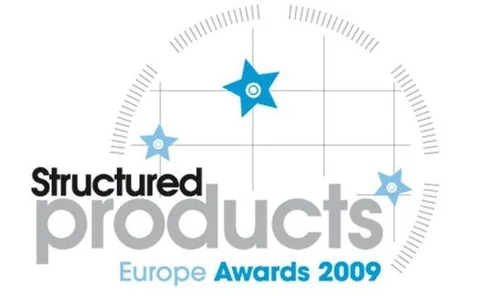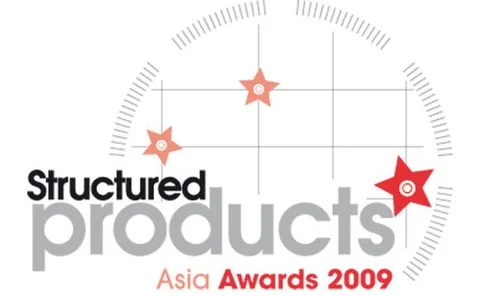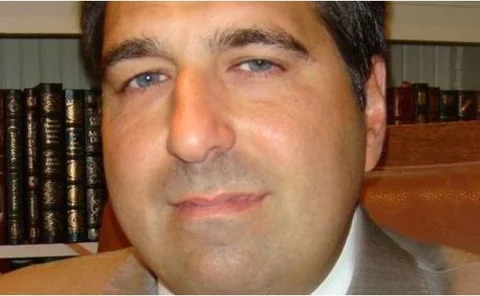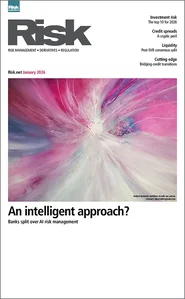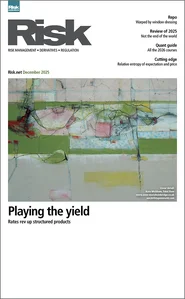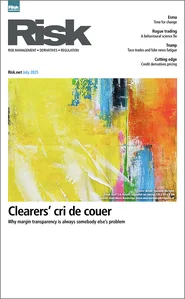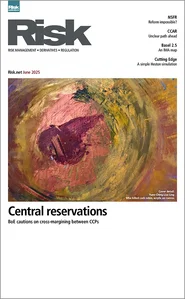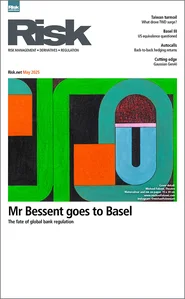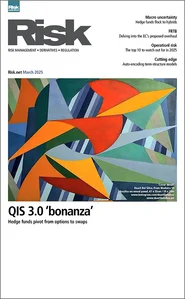Structured Products - Volume 5/Number 11
Articles in this issue
Thailand bucks trend and relaxes regulations
Thailand is back on the structured products radar as financial authorities there relax the laws governing the sale of structured products in sharp contrast to the rest of Asia.
Deutsche Bank lists hedge fund and carbon ETFs in London
Deutsche Bank has listed its hedge fund exchange-traded fund (ETF) on the London Stock Exchange (LSE). The listing of the Ucits III-compliant ETF, based on the db Hedge Fund Index, follows the launch of a euro-hedge version on the Xetra Frankfurt in…
ETF Securities debuts commodity funds on Tokyo Stock Exchange
ETF Securities has launched a new platform in Japan for physically backed precious metal commodities exchange-traded funds (ETFs). Five funds began trading on the Tokyo Stock Exchange on August 24.
HSBC launches its first ETF in Europe
HSBC issued its first exchange-traded fund (ETF) in Europe on August 25. Listed on the London Stock Exchange and tracking the FTSE 100 index, the Ireland-domiciled ETF will be sold first in the UK, and later in continental Europe. The total expense ratio…
Deutsche redeems Powershares ETNs
Deutsche Bank will redeem all outstanding Powershares DB Crude Oil Double Long exchange-traded notes (ETNs), according to a statement issued by the bank on September 1.
ProShares hit by lawsuits over leveraged ETFS
Exchange-traded fund (ETF) provider ProShares is the target of two class action lawsuits filed by Labaton Sucharow in the US over the performance of its UltraShort Real Estate and Financials funds. The actions come in the wake of media scrutiny over…
RBS returns to market with NDFA following Keydata collapse
Royal Bank of Scotland (RBS) is returning to the intermediary market with its new range of structured products after replacing its now-insolvent administrator Keydata with NDFA.
Morgan Stanley turns bullish on Asia exposure with four new ETFs
Morgan Stanley has unveiled a new play on Asian equity exposure in the US, a US$5million deal that links to an equally weighted basket of four exchange-traded funds (ETFs).
Winning strategies
The new breed of systematic structured products offers investors a third way between long-only managers and hedge funds. As well as providing strategies similar to hedge funds, but with better transparency, liquidity and lower costs, the products could…
Seeking simplicity
Almost a year after the collapse of Lehman Brothers, German retail investors are again becoming comfortable with products from US investment banks. This means that domestic players will need to fight hard to retain their increased market share as the…
Environmental exploitation
Recessions usually spell bad news for the environment. Promises of investment in clean energy and sustainable technology wither away as mediocre returns drive investors to count the cost of easing their conscience. But today's burgeoning green sector…
Battling the benchmark
In 2007, investors demanded more active commodity indexes to capitalise on the bull run in the asset class. But benchmarks and beta offerings alike were hit by last year's drawdown. Will this lead investors to abandon directional offerings in favour of…
House of the year - Société Générale
In a year when staff levels came under siege, Société Générale (SG) maintained headcount and suffered no major exodus of talent.
Best in Japan - HSBC
HSBC entered the Japanese structured products business as recently as 2008, but its range of top-drawer products has succeeded in capturing a significant chunk of the market despite the financial crisis and the damage caused by some banks mis-selling…
Best in Malaysia - CIMB
CIMB has won the Structured Products Malaysia house of the year award for three years in a row, and, despite stiff competition from some big international players this year, it beat all comers with a set of innovative products that were hugely popular.
Best in Taiwan - Standard Chartered Bank
If all regions in Asia have suffered as a result of the Lehman Brothers collapse, then Taiwan, where sales have almost ground to a halt more than once over the past 12 months, might well be the toughest place in which to resurrect the retail industry. On…
Equity derivatives house - UBS
The past 12 months have been unfeasibly tough for UBS, as they have for nearly all financial institutions in Asia. But the bank has distinguished itself during this period by constantly striving to improve client service, no matter how hostile the…
Index innovation - Standard & Poor's
The strategic markets approach has served Standard & Poor's (S&P) well over the past 12 months, specifically the index provider's Risk Control Indexes, Currency Beta Series, Asian Thematic Indexes and S&P 10 and S&P 40 indexes
Technology innovation - Numerix
The collapse of Lehman Brothers last year sent shock waves through the financial markets, pushing financial institutions and regulators to demand better transparency, valuation methods and risk metrics. Technology vendor Numerix was quick to react to…
ETF provider - Lyxor
While the early days of exchange-traded fund (ETF) provision mean that it is hard to differentiate between the offerings of the main providers, Lyxor, the ETF subsidiary of French bank Société Générale, stands out for the difference it has made to the…
Best in Australia - Citi
The market in Australia has received some shelter from the past year's financial crisis because fewer Lehman Brothers-backed products were distributed there than was the case elsewhere in the Asia-Pacific region. That aside, there has been no respite…
Best in China - Standard Chartered Bank
Structured Products Asia Awards 2010
Best in Hong Kong - HSBC
In a year that saw hundreds of investors take to the streets to protest about the mis-selling of Lehman Brothers-linked notes, HSBC managed to sidestep the controversy and continue issuing a full range of structured product
Best in India - Standard Chartered Bank
India's structured products market is still in its infancy, and has been as vulnerable to the fallout from losses on Lehman Brothers Minibonds as most other markets in Asia. Despite these drawbacks, Standard Chartered Bank has stood firm, ramping up…
Guardian of the gates
Simon Gray, director of supervision at the Dubai Financial Services Authority, talks to Richard Jory about the regulatory infrastructure in place for governing institutional, and more recently retail, structured products
Capinordic expansion
Capinordic Asset Management, part of the Denmark-based Capinordic Bank, is planning to launch a structured products distribution business in Sweden. Pierre Cooper talks to Johan Tjeder, the fund manager who has been brought in to help set up the operation
The White stuff
JW Advisors was established earlier this year by Joseph White, one of a growing number of intermediaries leaving investment banks to go independent. Now White is constructing credit diversified portfolios for institutional clients, who are reaping the…
Market snapshot
Tim Mortimer of Future Value Consultants looks at the pricing issues for structured products in different markets and provides his trade of the month
Trade of the month: Secondary trading
The secondary trading of structured products in the UK is limited by low liquidity, which is partly due to bid-offer spreads that are wide enough to deter investors. While most providers of retail structured products in the UK publish prices throughout…
Product performance
Products with strike dates in January and weekly valuations are reviewed this month
Autocalling China
Morgan Stanley has produced a two-year autocallable linked to the iShares FTSE/Xinhua China 25 Index Fund with a 10% buffer. Increases above the target level are not passed onto the investor
Sixteen again
Arc is offering a sterling-denominated play on emerging markets - specifically the iShares MSCI Brazil Index Fund ETF and Hang Seng China Enterprise Index - which promises returns of 16% for each year of its five-year term if no kickout occurs
All four one
MSS Investments has enlisted the Swedish Export Credit Corporation as issuer of a six-year capped growth product linked to the performance of a basket of global indexes based on infrastructure, equities, fixed income and emerging markets
